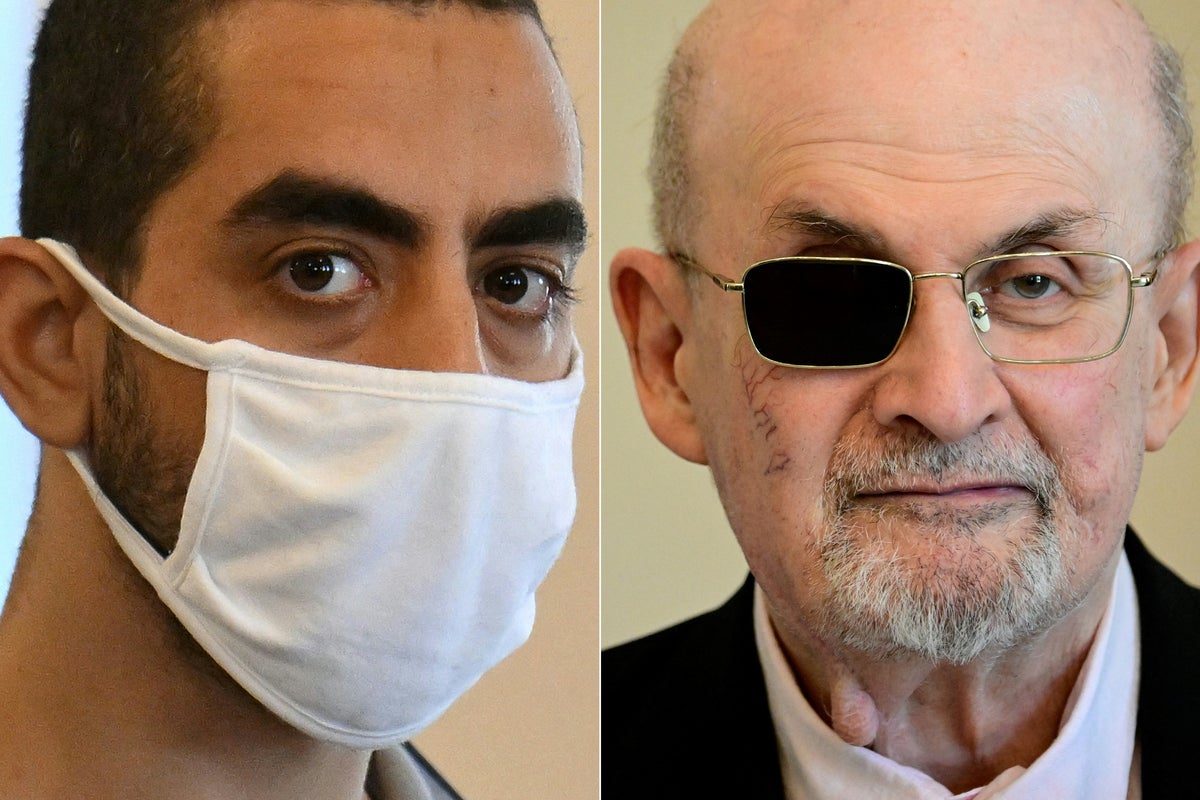The man convicted of trying to kill Salman Rushdie has been sentenced to 25 years in prison for the frenzied knife attack on the celebrated author.
A New York jury deliberated for less than two hours before convicting Hadi Matar of second-degree attempted murder in February. British-American author Rushdie was blinded in one eye in the harrowing attack in August 2022. The attacker was also found guilty of assault for injuring a man onstage with Rushdie.
Rushdie did not return to the Chautauqua County courtroom in western New York for his assailant’s sentencing Friday, but submitted a victim impact statement.
Matar received the maximum 25-year sentence for the attempted murder of Rushdie and seven years for wounding the man who was on stage with him. The sentences must run concurrently because both victims were injured in the same event, District Attorney Jason Schmidt said.
Before being sentenced, Matar stood and made a statement about freedom of speech in which he called Rushdie a hypocrite.
In requesting the maximum sentence, Schmidt told the judge that Matar “chose this.”
“He designed this attack so that he could inflict the most amount of damage, not just upon Mr. Rushdie, but upon this community, upon the 1,400 people who were there to watch it,” Schmidt said.
Public defender Nathaniel Barone pointed out that Matar had a otherwise clean criminal record and disputed that the people in the audience should be considered victims, suggesting that a sentence of 12 years would be appropriate.
The Booker Prize-winning novelist, 77, was about to speak in front of an audience at the Chautauqua Institution in western New York when Matar rushed at him onstage, stabbing and slashing him more than a dozen times.
Rushdie was stabbed and slashed in the head, eye, neck, torso, leg and hand, and spent 17 days at the hospital and more than three weeks at a New York City rehabilitation center.
On the second day of the trial, Rushdie faced Matar for the first time as he calmly told a jury about the frenzied moments of the attack, revealing that he believed he was going to die.
“I became aware of a great quantity of blood I was lying in,” Rushdie testified in court. “My sense of time was quite cloudy, I was in pain from my eye and hand, and it occurred to me quite clearly I was dying.”
Jurors were shown video footage of the attack during the trial.
“I want you to look at the unprovoked nature of this attack,” District Attorney Jason Schmidt said. “I want you to look at the targeted nature of the attack. There were a lot of people around that day but there was only one person who was targeted.”
The 2022 attack is the subject of Rushdie’s memoir Knife: Meditations After an Attempted Murder.
The celebrated Indian-born author has faced death threats since his 1988 novel The Satanic Verses was declared blasphemous by Iran’s then-supreme leader Ayatollah Ruhollah Khomeini.
The attacker’s defense argued that prosecutors didn’t prove Matar wanted to kill the author, a core component of the attempted murder charge.
Matar, of New Jersey, did not testify during the trial, and his defense did not call any witnesses on his behalf. After the guilty verdict was handed down, Matar said “Free Palestine,” as he was led out of the courtroom in handcuffs.
Matar was also indicted on federal terrorism charges related to the stabbing. A trial date for those charges has yet to be confirmed.
The terror indictment alleges Matar was motivated by the Hezbollah leader’s 2006 endorsement of Khomeini’s decades-old fatwa.
Matar pleaded not guilty to a three-count indictment charging him with providing material to terrorists, attempting to provide material support to Hezbollah and engaging in terrorism transcending national boundaries.
Rushie has been hailed as one of the greatest writers of his generation, and was awarded the Booker Prize in 1981 for Midnight’s Children. The title was also awarded the Best of Booker for a special anniversary prize in 2008.
The Associated Press contributed reporting

